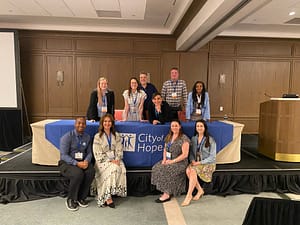
Compassion & Choices attendees at the End of Life Symposium
Compassion & Choices has been an integral partner since the inception of the City of Hope Interdisciplinary End of Life Symposium. As this year’s primary sponsor, our staff came to Las Vegas ready to lead a number of important workshop sessions. The conference was an incredible opportunity not only to discuss treatments for terminal illnesses but also for us to educate clinicians on the complexities of end-of-life care. We are proud to continually partner with City of Hope, and we are already looking forward to next year’s symposium. In a week filled with cutting-edge research, inspiring stories and hope, these are the five highlights that left a lasting impression:
We cannot talk about the end of life without discussing compassionate end-of-life decision-making. Our team led the way with Navigating a Request for Medical Aid in Dying, a detailed panel discussion featuring clinicians who have firsthand experience with patients who have requested medical aid in dying. The team let the audience ask questions anonymously, which allowed for conversations on balancing patient preferences with medical recommendations, ensuring dignity in dying and navigating legal frameworks. I am glad we were able to offer this option, as anonymity enabled people to ask questions they may have otherwise been reluctant to.
Many clinicians emphasized that compassionate care begins with building patient trust. Techniques included always speaking at eye level with the patient, active listening rather than note-taking and, controversially, not wearing a white lab coat. These clinicians stressed that increased trust facilitated open communication, shared decision-making and higher patient satisfaction. It was incredibly encouraging to see so many clinicians in agreement that by focusing on building trust they had seen demonstrably improved health outcomes.
One of the most powerful sessions of the conference was not about cutting-edge research or new potential treatments — it was actually a role playing workshop. Moderated by our Clinical Engagement and Education team, A Journey Through Life With Dementia used live-action scenarios to explore how a patient with dementia experiences end-of-life care. The strength of the workshop was its unflinching account of how even slight changes by the attending physician can have a profound impact on the patient experience. Clinician after clinician in the room validated the scenarios, explaining that they had struggled with the very same issues being explored. It was incredible to see that even in a week filled with industry experts, honest storytelling stood out among the other sessions.
The conference underscored the pivotal role of families and loved ones in end-of-life care. Sessions addressed the emotional, psychological and practical challenges faced by caregivers navigating terminal illnesses. The sessions were intensely personal: A mother explained how she dealt with the grief of suddenly losing her son to illness, and a physician lamented the clinical approach she took with her own mother’s terminal cancer diagnosis. Effective strategies to support family caregivers, enhance communication and foster shared decision-making processes were explored. The importance of holistic, family-centered care approaches in promoting patient comfort and dignity at the end of life was a major takeaway.
Culturally competent healthcare was a recurring theme throughout the symposium. Speakers from Romania, India, Greece and Mozambique explained why integrating their patients’ cultural beliefs, values and practices is essential for achieving positive health outcomes. Culturally competent healthcare ensures that treatment plans are tailored to meet the unique needs of diverse patient populations, thereby improving adherence to medical recommendations and patient satisfaction. It was refreshing to hear how increased cultural competency can help mitigate disparities in end-of-life care and improve health outcomes for our communities.
It reinforced our commitment to advocating for patient-centered approaches that prioritize dignity, comfort and respect in every stage of life. We are proud to continually partner with City of Hope and look forward to next year’s symposium.
For more information about the End of Life Symposium and upcoming events, visit City of Hope’s website.
Our successful participation in this conference would not have been possible without the incredible efforts of the Clinical Engagement and Education team, and all of our staff members who took the time to attend and faithfully represent Compassion & Choices. Special thanks to Jessica Empeño, Brandi Alexander, Michael Cavaiola, Ashley Frey, Gina Gentry, Mickey MacIntyre, Rebekah Malloy, Missy Moore, Samantha Trad and Katie Titus.
Compassion & Choices
Media Contacts
David Blank
Media Relations Director
[email protected]
Phone: (227) 225 6553
Patricia A. González-Portillo
Senior National Latino Media Director
[email protected]
(323) 819 0310
Mail contributions directly to:
Compassion & Choices Gift Processing Center
PO Box 485
Etna, NH 03750